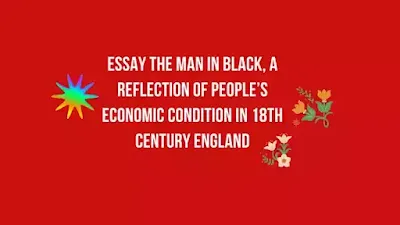Introduction:
The essay, The Man in Black is the reflection of Goldsmith's personal feelings. It presents him as a great social thinker and reformer who puts his mind on the poor economic condition of people of England in the eighteenth century. In the present essay, the essayist brings before us a lively picture of those who come into his personal contact. Through the pathetic condition of the beggars, he becomes able to present all the evils of England of 18th century.
 |
| Essay The Man in Black, A Reflection of People’s Economic Condition in 18th Century England |
Poverty, Unemployment, Starvation and Beggary:
In the 18th century in England, a large number of people were suffering from poverty. They were utterly broken in financial condition. Most of them could not support their family because they had no means to earn their livelihood in order to provide their family. The government also failed to provide the sources of their income. It had no scheme for the unemployment. The people were forced to live on the edge of starvation. The unskilled people were generally poor and unemployed. They were not only jobless but also homeless and rootless. An Act of British Parliament had dispossessed small land - holders. The result was that the people in the countryside were turned landless, homeless and jobless. Some of them became labourers while many of them became beggars. Indeed it was unfortunate that the small land owners under the eyes of government authority. The government had no way to solve this problem. The sailor with wooden leg and the poor woman with two babies are true representatives of that age of England.
Limited Opportunity for Jobs and Other Professions:
The jobs and other professions were limited. Few people belonged to the service - class. Only highly talented people could get jobs in government sectors, but the people of service class were not given the proper facilities. After being unfit for the jobs, they were dismissed without giving them any financial support, so it took little time for them to come on the way of beggary. In the essay, the old sailor also belonged to service class. When he lost his leg fighting the war for the defence of his country, he was dismissed from the job. He was paid no pension or other compensation, so he had to earn his livelihood by selling the matches. The number of liberal professions was limited. Trade and commerce seems to have been to a few countries. The people sold petty things like matches. The writer himself earned his livelihood by writing articles.
No Honour and Value of the Army Soldiers:
The people showed no respect for those soldiers who defended their country without caring their lives. It was very unfortunate that the disabled soldiers were left to live on their fate. They were given no pension or other compensation. No rich person helped them. These soldiers were forced to live a life of beggar. In the essay, the old sailor was an officer on a private ship of war and he lost his leg while fighting war in defence of those who lived and enjoyed their life comfortably in their houses. The old sailor was left helpless. He earned his living by selling the articles.
The Problem of Beggars:
Although the government made a few arrangements for the poor, yet they were not satisfied and they left the parish houses to become beggars. In this way, the number of beggars increased day by day in England and the begging became a sort of profession. These beggars created a great problem in the country. The magistrates and police were also responsible to encourage this great crowd of the beggars. They were inactive in taking any action against them. These beggars were great burden on industrious people. Some of the beggars were hypocrites and impostors. They cheated and deceived people. They adopted various methods to win other people's sympathy. They used to tell false stories of their poverty to impress the gentlemen.
Rapid Growth of Population:
The rapid growth of population was also responsible for the problems of poverty, beggary, unemployment and houses. In the essay, the old man with his dying wife and five starving children and the miserable woman with one baby in her arms and another on her back show how men and women with large families but without having any source of their livelihood were reduced to utter poverty and how the idle fellows posed as beggars and cheated passengers.
Expansion of Small Scale Industries:
The small scale industries were increasing. Many people were involved in manufacturing small and petty articles and sold these articles on the roads to the pedestrians. Boats and small ships were also manufactured in the country, but these things were supplied in a limited way. The government also encouraged the small scale industries so that many jobless people could earn their living and the poverty could extently be reduced. But in spite of it, most of the people belonged to the labour class or lower strata of the society.
The Living Standard of Common Men:
The common men also lived a hard life. They were also the victims of many problems. They, too, had limited income. They had to live within their source of income. They had also to face great difficulty to fulfil their vital needs. They could not spend their money without thinking a lot. If, by mistake, they spent their money, they had to wait until they got their routine money. The man in black spent only two silver coins and his pocket was empty.
Thus, it can be observed through the essay that the people living in England of 18th century were not very well - off. They were poor and selfish. They lived only for their own interests. Those who were below poverty line could hardly make both ends meet. Most of the poor adopted the profession of begging. Beggary had become the profession to earn money without doing hard work, so these people had become idle and were the burden on hard - working people. The picture which the essayist presents about England in the post war period is very horrible.





